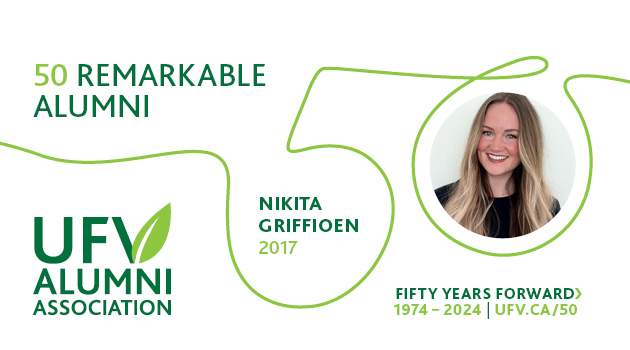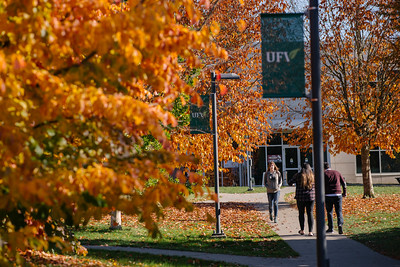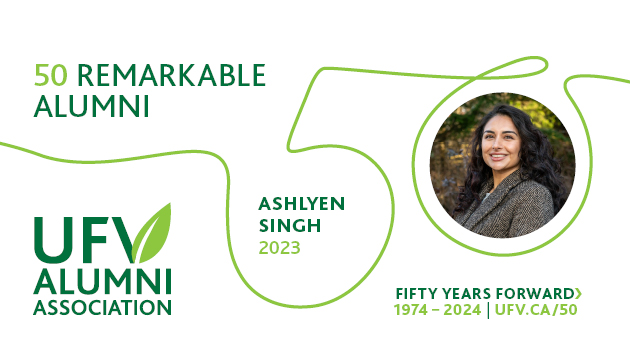Fast and Fernstrom: UFV’s first soccer coaches tapped for Cascades Hall of Fame

There was lots of grunt work and little glamour or glory for the coaches in the early years of UFV’s men’s soccer team, but the two co-coaches still count the experience as a highlight of their lives.
And for their pioneering contribution to the founding of UFV’s soccer program, retired UFV professors Scott Fast and Ken Fernstrom are being honoured in the Builder category at this year’s Cascades Hall of Fame induction ceremony on January 5.
Fast, a political science instructor, and Fernstrom, a communications instructor, were the first coaches of the men’s soccer team, which had its inaugural season in 1987. This was a part-time pursuit, squeezed in alongside of teaching duties. Fast coached on his own the first year, then brought Fernstrom on as co-coach when he heard a dinner party that his colleague had played some soccer in his youth.
“We did everything in those days, and with very little funding,” Scott recalls. “We used empty ice cream buckets as cones, lined the fields ourselves, drove into Hastings Street in Burnaby to get equipment, and wrote our own press releases.”
As for recruiting, for the first couple of years, it was sometimes as simple as perusing who was sitting in front of him in the classroom.
“I’d go into class and ask, ‘Are any of you soccer players? Oh, you’re a striker? Great, you start on Saturday,” Fast recalls.
“It was a struggle to get organized to do any scouting or recruiting and to land a competitive pool of players,” he notes. “We’d send game recaps to the local papers to hype up the program and make it seem like college soccer was a big deal.”
By 1989, they had recruited three or four key players, and in 1990, they had what Fast recalls as “our first really good year”; it ended with a heartbreaking playoff loss to eventual national champions Capilano College.
But players only had three years of eligibility in the Canadian Colleges Athletic Association in those days, and soon moved on.
Then when Fraser Valley College and others became four-year institutions, eligibility was also raised to four years, and the coaches suddenly had competitive players wanting to come back, continue their education, and give collegiate soccer one more kick.
“In 1995, for one golden year, we had a group of really committed, talented players, including the goalkeeper for the Olympic team,” Fast recalls. “Some were guys who’d played with us in 1990 who came back when then years of eligibility were increased. They wanted one more shot at a title. So we combined the stars of a few years prior with some really good new players and built our best team yet.”
This team made it to the national final and earned a silver medal.
“Ken and I were discussing what our all-time top Cascade dream team of the teams we coached would be, and nine of the 19 on our roster were from that 1995 team,” Fast recalls.
The Fraser Valley was not a hotbed of soccer in the 1980s and early ‘90s, and there wasn’t much soccer to be viewed on local television, Fast notes.
“We could watch the World Cup every four years, but other than that you had to get up at 5 am to watch some games from Europe on TSN, so our players hadn’t really been exposed to a lot of great soccer. The style in the Fraser Valley was a lot of kick and run, so we did okay if we had a player who could really kick and a player who could run, but that wasn’t the case every year. Some years we were glad just to make the playoffs. Players from the city would run circles around us at times.”
Fernstrom and Fast weren’t expert coaches at the beginning, but they did their best with the knowledge they had.
“I had coached my kids in youth soccer from age six to their teens and I took some coaching clinics to improve. I had also coached a lot of other sports and knew that the key to success was creating space for your players to do what they needed to do, while not giving the other team space. Sometimes it seems the less I knew the better we did. I used an unconventional at the time 3-5-2 lineup because our midfield was weak and I needed five guys there just to stop the other team.”
One innovation that Fernstrom and Fast brought to the league was videotaping their games to analyze with the players later and scouting the opposition by travelling to video them too.
“It got to the point where the opposition knew Fraser Valley because of the ponytailed guy (we both had them in those days) with the video camera.”
They also founded a pre-season tournament that allowed them a good look at the competition and exposed their players to a variety of college teams from the Pacific Northwest and BC.
“In the days before email that took a lot of work, letter writing, and phone calls to set up,” recalls Fast.
“It’s nice to be honoured,” he notes. “It was an awful lot of work but also a very satisfying experience.”
Ken Fernstrom calls his co-coaching the Cascades one of the best experiences of his life.
“It brought me access to a community I hadn’t experienced before. I never thought I’d be a varsity soccer coach. I gained a real appreciation for varsity athletes, especially in Canada where the financial support for them was minimal.”
Watching how hard his athletes worked made the extra work he’d taken on in addition to teaching worth it for him.
“They’d be taking courses, playing for their club teams in addition to us, working part time, and maintaining their social lives. Coaching these guys was a really bonding and unifying experience for me. It added to my Fraser Valley sense of community. And as a bonus I got away with wearing track suits to class!”
Fernstrom has been in touch with some of the players from the 1995 squad, who are being inducted into the Cascades Hall of Fame in the team category on Jan. 5, and reports that most are coming to the ceremony and are “very stoked” about the experience.
Scott Fast and Ken Fernstrom played key roles in the establishment and growth of the Cascades men’s soccer program. Fast was the team’s first-ever head coach, beginning in 1987, and with the exception of a sabbatical year (1997), was a fixture with the program through 2003. He accrued 46 wins in conference play and earned BCCAA coach of the year honours in 1990 and 1995. Fernstrom joined the coaching staff in 1988, and continued for an additional season after Fast’s departure, serving as team manager alongside new bench boss Alan Errington. Under Fast and Fernstrom, UFV men’s soccer earned two first-place finishes in the BCCAA regular season (1990 and 1995), a trio of conference medals (gold in 1995, silver in 1990, and bronze in 2001), and a CCAA national bronze medal in 1995. They epitomized the “builder” concept, laying the groundwork for the Cascades’ eventual move up to Canada West and U SPORTS. Fast and Fernstrom coached winter, indoor and summer league teams and organized the annual FVC/UCFV International Tournament. They were honoured in 1993 with a UCFV outstanding achievement award for “extraordinary contribution both to students and the community” as Cascades coaches.





